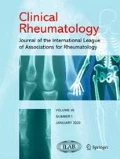Dear Editor,
We thank Dr. Akkoç and Dr. Akar for their interest in our article and for their valuable contribution of the previous literature on the epidemiology of rheumatoid arthritis (RA) in Turkey. None of the former surveys were nationwide; on the contrary, these surveys were mostly limited to a narrow region, such as the one conducted on Balkan immigrants [1]. The study of Dr. Akkoç and Dr. Akar was conducted, as well, in only two quarters of Izmir and did not cover the other quarters, especially those that were inhabited considerably by the people of rural origin [2]. This might be regarded as providing a sampling bias. Taking into account the rapidly ongoing urbanization process in Turkey, we therefore made our sampling representing the urban Antalya as a whole [3]. Nevertheless, it is surprising that both they and we have estimated comparable prevalence rates of RA in surveys conducted in different cities but at time intervals close to each other. However, we do not agree with Dr. Akkoç and Dr. Akar as to the direct standardization of our findings to the general population of Turkey, because for direct standardization, one needs to know the specific rates of each population to be compared. Because neither a specific nor a crude prevalence rate of RA for the general population of Turkey exists for the time being, even an indirect standardization cannot be estimated. So, the kind of standardization that they propose remains undetermined.
Although we intended to estimate a cumulative prevalence rate in our study, recall errors due to a “memory decay”, especially for the patients in prolonged remission, might result in a cumulative prevalence rate lower than expected [4]. On the other hand, as we stated earlier, a systematic recording is not available in the Turkish health care system, and we attained only one patient’s record [3]. This might be regarded as a drawback of our study; however, missing some of the cases in remission is unavoidable in epidemiological studies conducted in developing countries, at least owing to the inaccessibility of the cases to the health care system and inadequate recording of diseases.
References
Yenal O, Lav I, Bilecen L (1968) Epidemiological study on the infectious rheumatic syndrome in Turkey. II. Occurrence of rheumatoid arthritis in the Sagmalcilar district of Istanbul. Influencing of various factors and tuberculosis. Z Rheumaforsch 27:215–223
Akar S, Birlik M, Gurler O, Sari I, Onen F, Manisali M, Tirpan K, Demir T, Meral M, Akkoc N (2004) The prevalence of rheumatoid arthritis in an urban population of Izmir–Turkey. Clin Exp Rheumatol 22:416–420
Kacar C, Gilgil E, Tuncer T, Butun B, Urhan S, Arikan V, Dundar U, Oksuz MC, Sunbuloglu G, Yildirim C, Tekeoglu I, Yucel G (2005) Prevalence of rheumatoid arthritis in Antalya, Turkey. Clin Rheumatol 24:212–214
Volinn E (1997) The epidemiology of low back pain in the rest of the world: a review of surveys in low- and middle-income countries. Spine 22:1747–1754
Author information
Authors and Affiliations
Corresponding author
Additional information
The online version of the original article can be found at: http://dx.doi.org/10.1007/s10067-005-0092-2.
Rights and permissions
About this article
Cite this article
Gilgil, E., Kaçar, C. & Tuncer, T. Reply to the report: epidemiology of rheumatoid arthritis in Turkey (by N. Akkoc, S. Akar). Clin Rheumatol 25, 772 (2006). https://doi.org/10.1007/s10067-006-0341-z
Published:
Issue Date:
DOI: https://doi.org/10.1007/s10067-006-0341-z

